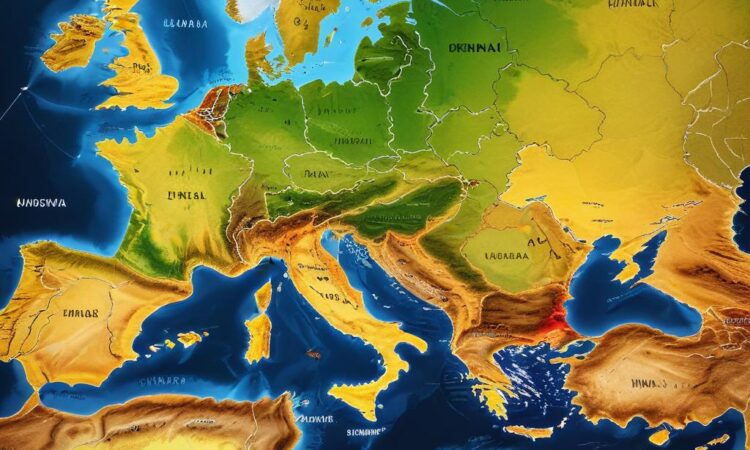Impact of the War in Ukraine on Global Energy Markets
The ongoing conflict in Ukraine continues to significantly impact global energy prices, particularly natural gas and oil. Sanctions imposed on Russia, a major energy exporter, and the physical disruption of supply chains due to the war have created a volatile market characterized by significant price increases and inflationary pressures worldwide. The crisis has highlighted the interconnectedness of global energy markets and the vulnerability of many nations to geopolitical instability.
Before the war, Russia played a crucial role in supplying Europe with natural gas, making the continent heavily reliant on its energy exports. The conflict has dramatically altered this dynamic. The reduction in Russian gas supplies has forced European nations to scramble for alternative sources, leading to intense competition in the global gas market and driving up prices. This has had a ripple effect, impacting industries across the continent and leading to concerns about energy security and the potential for energy rationing during the winter months.
The impact extends beyond Europe. Developing economies, many of which are heavily dependent on energy imports, are also facing the consequences of higher energy prices. These increased costs impact various sectors, from transportation and manufacturing to agriculture and household consumption. The inflationary pressure stemming from the energy crisis disproportionately affects vulnerable populations, exacerbating existing inequalities and potentially leading to social unrest.
The war has spurred discussions around energy security and diversification strategies. Countries are actively seeking ways to reduce their reliance on single suppliers and explore alternative energy sources, such as renewable energy, to enhance their resilience to future disruptions. This includes investing in renewable energy infrastructure, improving energy efficiency, and strengthening energy partnerships with other nations.
Numerous reports and analyses have delved into the intricate geopolitical and economic consequences of the war on different regions. These studies examine the shifting energy alliances, the changing dynamics of global energy trade, and the longer-term implications of the conflict for the global energy landscape. The findings highlight the need for a more resilient and diversified energy system, less susceptible to geopolitical shocks.
The volatility in oil prices is also a major concern. Although less directly affected by the sanctions than natural gas, the war has contributed to uncertainty in the oil market. The disruption to supply chains, the threat of further sanctions, and the overall geopolitical uncertainty have all played a role in driving up oil prices. This has implications for global inflation and economic growth, impacting various sectors including transportation, manufacturing, and agriculture.
The long-term consequences of the war on global energy markets remain uncertain. The duration of the conflict, the effectiveness of sanctions, and the pace of energy diversification efforts will all play a role in shaping the future energy landscape. However, it is clear that the war has fundamentally altered the global energy market, highlighting the need for a more sustainable, secure, and diversified energy system. The need for international cooperation and investment in renewable energy sources is now more urgent than ever before.
The price increases have not only affected consumers directly but have also impacted businesses, leading to increased production costs and potentially impacting economic growth. Governments are grappling with how to mitigate the effects of higher energy prices on their citizens, balancing the need to support their economies with the desire to maintain fiscal responsibility. Some countries have implemented price caps or subsidies to lessen the burden on consumers and businesses.
Beyond the immediate economic effects, the war has raised concerns about energy security on a national and global level. Countries are reevaluating their energy policies and exploring strategies to enhance their energy independence and resilience. This includes investing in domestic energy production, diversifying energy sources, and strengthening international energy partnerships.
The crisis has highlighted the need for a more integrated approach to energy policy, taking into account environmental sustainability, economic development, and national security. The transition to a cleaner energy future, while already underway, has now become even more critical in the face of the challenges posed by the war in Ukraine. The urgency of this transition has been amplified by the current energy crisis.
The war in Ukraine serves as a stark reminder of the fragility of global energy markets and the geopolitical risks associated with over-reliance on specific energy sources and suppliers. The events unfolding underscore the importance of investing in energy diversification, promoting energy efficiency, and fostering international cooperation to build a more resilient and sustainable energy system for the future.
The impact extends far beyond the immediate price increases. The war has exposed vulnerabilities in global supply chains, highlighted the limitations of current energy infrastructure, and forced a reassessment of national and international energy strategies. The resulting changes will likely have long-lasting effects on the global energy landscape.
Experts are closely monitoring the situation and its evolving consequences, providing regular updates and analysis to inform policymakers and the public. The discussions surrounding energy security, diversification, and the transition to renewable energy are likely to continue for many years to come. The war in Ukraine has fundamentally reshaped the global energy landscape, and its impact will be felt for years to come.
The crisis has also prompted renewed interest in exploring alternative energy sources and technologies, including nuclear power and hydrogen. These sources are seen by some as potentially playing a greater role in the future energy mix, although each carries its own set of challenges and considerations. This intensified focus on alternative energy sources may accelerate the transition toward a more diversified and sustainable energy system.
In conclusion, the war in Ukraine has created a profound and multifaceted impact on global energy markets. The consequences are far-reaching, extending beyond simple price increases to encompass broader issues of energy security, geopolitical stability, and economic development. Addressing these challenges will require a concerted global effort, encompassing investment in renewable energy, diversification of energy sources, and strengthened international cooperation.

